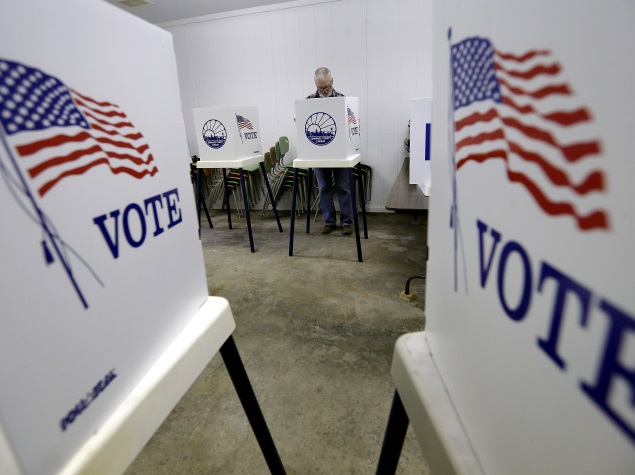- Home
- Internet
- Internet Features
- Survey Shows Internet's Broadening Political Role
Survey Shows Internet's Broadening Political Role

More Internet users than ever view online efforts as key to political campaigns, according to a survey released Thursday by the University of Southern California.
The USC Annenberg School's Center for the Digital Future has polled more than 2,000 U.S. households about their Internet and technology use each year, starting in 1999. It has published the results every year since 2000, with the exception of 2011.
The latest results from the 2013 survey show that that 75 percent of Internet users age 16 and older agree that the Internet is important for the political campaign process. That was up from the previous high response of 72 percent in 2010.
And 37 percent of users in that age range said that by using the Internet, people like them can have more political power. That's up from 29 percent in 2000.
"We may be entering a realm where the Internet plays a larger role in political campaigns than television does," Jeffrey Cole, director of the Center for the Digital Future, said in a statement.
In 2012, television ads were the primary communications tool for the campaigns of President Barack Obama and his Republican challenger Mitt Romney, despite the gradual but persistent shift of viewers from television to the Internet. But both teams maintained a robust social media presence and used online ads for micro-targeting voters based on their reading and shopping habits.
"The question is becoming which party uses online technology better - who has a message that resonates most effectively through digital media, and whose audience is more willing to participate in elections because of the Internet," Cole said.
The report said that 63 percent of the Internet users polled agree that going online can help users better understand politics, while 34 percent agree that the Internet will make public officials care more about what users think.
Some other key findings include:
- 41 percent of Internet users said that most or all of the information online is reliable. That is the lowest level reported in the Digital Future studies since 2009, when it was 39 percent.
- 75 percent said most or all of the information on the sites they visit regularly is reliable and accurate - but that percentage is the lowest to date of all the Digital Future studies.
- 31 percent of adults said the children in their household spend too much time online. That's one percentage point below the high of 32 percent in 2012.
- 56 percent of Internet users are concerned about companies checking what they do online, while 46 percent are worried about the government checking what they do online.
- 79 percent of adults who use the Internet make purchases online. And 60 percent said that online purchases reduced their buying in traditional retail stores.
- 47 percent of respondents age 18 and older who have a credit card are very concerned or extremely concerned about credit card security when buying online. That's up from 44 percent in 2012 but down from 71 percent in 2001.
- 11 percent of Internet users said they have been harassed or bullied online.
Get your daily dose of tech news, reviews, and insights, in under 80 characters on Gadgets 360 Turbo. Connect with fellow tech lovers on our Forum. Follow us on X, Facebook, WhatsApp, Threads and Google News for instant updates. Catch all the action on our YouTube channel.
Related Stories
- Samsung Galaxy Unpacked 2026
- iPhone 17 Pro Max
- ChatGPT
- iOS 26
- Laptop Under 50000
- Smartwatch Under 10000
- Apple Vision Pro
- Oneplus 12
- OnePlus Nord CE 3 Lite 5G
- iPhone 13
- Xiaomi 14 Pro
- Oppo Find N3
- Tecno Spark Go (2023)
- Realme V30
- Best Phones Under 25000
- Samsung Galaxy S24 Series
- Cryptocurrency
- iQoo 12
- Samsung Galaxy S24 Ultra
- Giottus
- Samsung Galaxy Z Flip 5
- Apple 'Scary Fast'
- Housefull 5
- GoPro Hero 12 Black Review
- Invincible Season 2
- JioGlass
- HD Ready TV
- Latest Mobile Phones
- Compare Phones
- Tecno Pova Curve 2 5G
- Lava Yuva Star 3
- Honor X6d
- OPPO K14x 5G
- Samsung Galaxy F70e 5G
- iQOO 15 Ultra
- OPPO A6v 5G
- OPPO A6i+ 5G
- Asus Vivobook 16 (M1605NAQ)
- Asus Vivobook 15 (2026)
- Brave Ark 2-in-1
- Black Shark Gaming Tablet
- boAt Chrome Iris
- HMD Watch P1
- Haier H5E Series
- Acerpure Nitro Z Series 100-inch QLED TV
- Asus ROG Ally
- Nintendo Switch Lite
- Haier 1.6 Ton 5 Star Inverter Split AC (HSU19G-MZAID5BN-INV)
- Haier 1.6 Ton 5 Star Inverter Split AC (HSU19G-MZAIM5BN-INV)







![[Partner Content] OPPO Reno15 Series: AI Portrait Camera, Popout and First Compact Reno](https://www.gadgets360.com/static/mobile/images/spacer.png)









